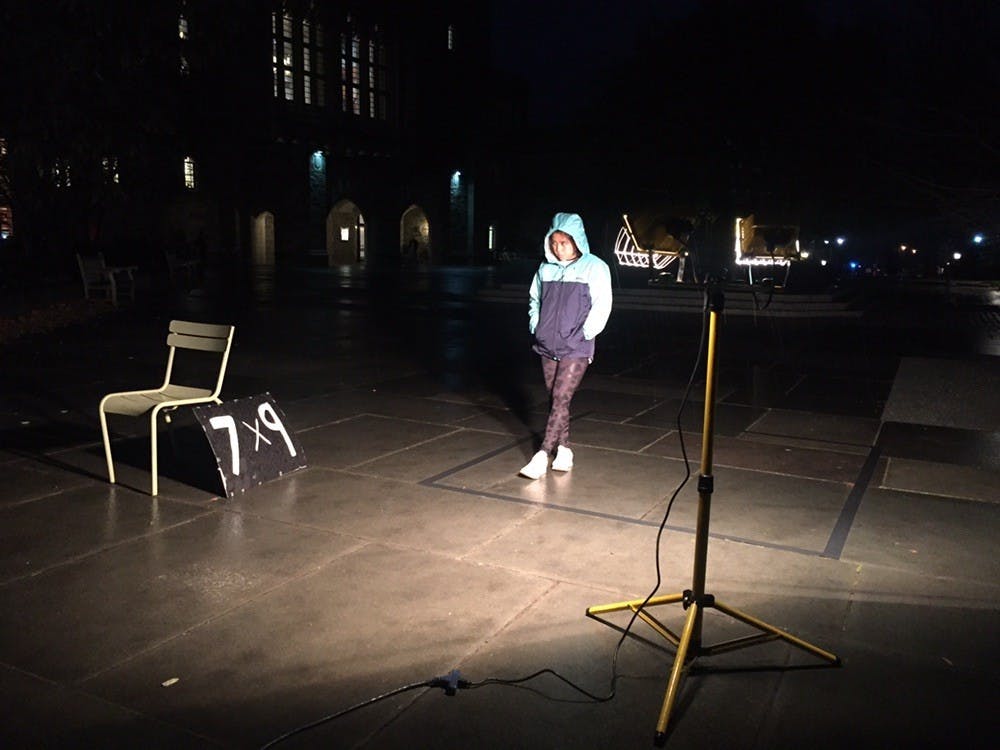Students for Prison Education and Reform (SPEAR) held a performance protest, “7x9,” in front of both Firestone Library and Frist Campus Center from 5 p.m. on Nov. 7 to 5 p.m. on Nov. 8.
“7x9” is meant to bring awareness to the use of solitary confinement in prisons. SPEAR has held the “7x9” demonstration annually for the past seven years. The protest’s name, “7x9,” refers to the average size of a solitary confinement cell — seven feet long by nine feet wide. During the protest, a student stood in a taped-off seven by nine foot rectangle, with a light illuminating the scene. The students neither interact nor looked at any passersby, thus mimicking the isolation of solitary confinement.
“In no way does this performance represent the experience of people who have been confined in solitary cells,” SPEAR states on their event page. “7x9 is only an abstraction, an entry point or reminder for people to catalyze learning about solitary confinement.”
The performance protest has typically been accompanied by a talk from a formerly incarcerated person. This year’s speaker was Mark Hopkins.
Forty-six students took part in the protest, with each volunteer standing for one hour in front of either Firestone Library or Frist Campus Center, for a total of 23 hours of performance at each location.
“We had students from all over Princeton’s community, from freshman to seniors, participate in the piece,” said Noam Miller ’21, one of the event’s organizers and a member of SPEAR.
Despite rain on Thursday night and chilly winds Friday morning, the volunteers stood nearly motionless in their positions.
For the last hour at each location, the sections were left empty to represent the one hour incarcerated people are allowed out of their cells.

“Because I could see people, it is a different experience from what real solitary confinement is like,” said Kennedy Mattes ’23, who stood the second shift in front of Firestone Library. “I was trying to imagine what it would be like if there were four walls and I couldn’t.”
“I wanted to fully immerse myself in the experience,” Mattes added.
Mattes took off her watch for her shift, adding that trying not to think about the time passing was the most difficult part of the experience. Mattes is currently a SPEAR member and participates in the re-entry working group. She said that 7x9 has motivated her to join Project Solidarity, a SPEAR correspondence initiative in which students write to an incarcerated person who has experienced solitary confinement.
After the performance ended on Nov. 8, SPEAR members and other interested students gathered at East Pyne Hall to listen to Mark Hopkins, the formerly incarcerated speaker. Hopkins shared his experiences in solitary confinement in the New Jersey prison system and discussed the activist work he does now.

Though Hopkins was sentenced at the age of 15, he was incarcerated in an adult prison. At 16, he first encountered solitary confinement and administrative segregation. During his incarceration, Hopkins participated in the prison education program NJ-STEP, and he received a B.A. from Rutgers University after being released.
During the talk, Hopkins described the conditions and the “daily struggles” of isolated confinement, such as obtaining an education and keeping one’s mind entertained while deprived of human contact.
Hopkins also shared a spoken-word poem and explained how he found poetry as a mode of self-expression while incarcerated. He stated that poetry, in his opinion, is “the pinnacle of human society” and “a phenomenon [he] fell in love with.”
Hopkins is a self-proclaimed “prison abolitionist” and stated during his talk that confinement of any kind, but especially solitary confinement, “has never been an answer to any form of behavior.”
During his talk, Hopkins also described the activist work he has done with the The New Jersey Campaign for Alternatives to Isolated Confinement (NJ CAIC) and encouraged students to get involved with activism and start conversations about prison reform and isolated confinement.
At the end of the talk, Hopkins called for students to “be critical of white supremacy and white privilege” and to look into the impact of mass incarceration of marginalized communities.








